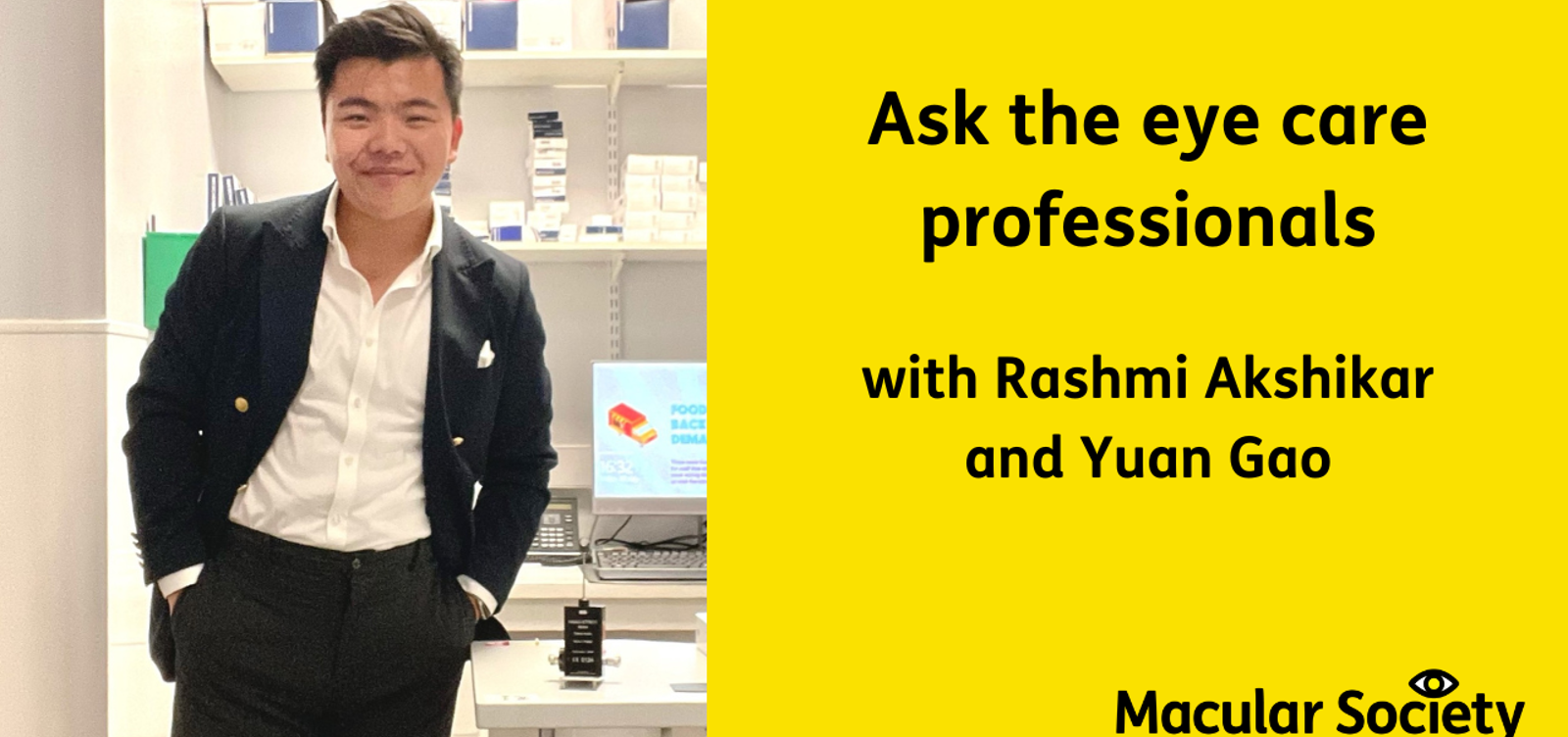Optometry vs ophthalmology – your questions answered
Posted: Wednesday 01 May 2024
Are you familiar with the distinction between an optometrist and an ophthalmologist, and how each professional can support you?
Optometrist Yuan Gao and consultant ophthalmic surgeon and retinal specialist, Rashmi Akshikar joined us for April’s My Macular and Me webinar.
The pair, from Imperial College Healthcare NHS Trust, answered all your macular and eye-health related questions.
We explore some of the key questions from the session:
What is the difference between an optometrist and an ophthalmologist? When should I see each?
“Most of the time people don't know,” Yuan said. “They know ophthalmologists pretty well, but they don't know what an optometrist is.
“Optometrists are eye specialists, so we've taken care of patient's eyes from the primary care level most of the time. Sometimes we do work in the hospital, just like myself, I work in a hospital full time. Most of our optometrists are working high street opticians or they do work in different environments, like they can be domiciliary optometrists to do home visits.”
“If you do have any discomfort in your eyes or somethings going on, you can’t see as well or you see distortions. Whatever you feel is wrong with your eye theoretically you can see your optometrist first.”
Adding more about an ophthalmologists’ role Rashmi added: “An ophthalmologist is a doctor who knows everything about the body and then specialises into the eye, treatment of the eye and surgery for the eye.”
I have a problem with my eye, should I see my GP first?
Yuan explained that if you have problems with your eyes, your first port of call should always be your local optician/optometrist.
He said his patients and friends often ask him if they should see their GP for a problem with their eyes, but his answer is always the same.
“Please don't see GP,” he said. “Because the GP will tell you to go to see your optician. So, optometry first is a good decision.”
How often should I see an optometrist, especially if I have dry AMD?
"In some cases we do see some patients with dry aged-related macular degeneration (AMD) in hospital settings but I think it’s only when the dry AMD is at the very advanced stage,” Yuan said. “I do recommend people who have dry AMD, or who even have early changes or macular problems, should see your optometrist on a regular basis.”
Yuan went onto highlight that the frequency of visits to your optometrist depends on the severity of the condition. However, he also strongly recommended everyone see an eye health professional, at least every two years.
“It’s like seeing your dentist,” he encouraged.
Is it true that optometrists focus on the front of the eye and ophthalmologists focus on the back of the eye?
“That's not a correct statement,” said Yuan. “We look after patients in primary care. We do know everything about eyes, so we are more like a GP for the eye.
“We see you, we figure out what is going on, which part needs a bit more care and what needs to be fixed. But, when it comes to fixing, it is ophthalmologist's job. So, we will refer this patient to a specialist clinic to do further investigations, if anything to be sorted, they will look after patients in secondary care.”
Can optometrists differentiate between dry and wet macular disease?
Yuan said: “I think it really depends on where the optometrists see this patient. Because, I have worked in a community in the past, we, in some of the community practices, do have limited access to some highly specialised machine.
He added: “The good thing is that most of the UK practices have adopted OCT scans. So differentiating dry and wet AMD is much easier nowadays.”
Is it safe to take AREDS supplements indefinitely?
Rashmi suggested that the effectiveness of the supplements may vary based on an individual's genetic makeup. Specifically, if someone carries a gene that predisposes them to develop wet AMD then the supplements might not be as effective in preventing progression.
Read more about AREDS.
“I’m severely sight impaired, is there any point in seeing an optician/optometrist regularly?”
Yuan explained that it is important for everyone to get their eyes tested regularly. He went onto highlight the benefits of seeing an optometrist if you are severely sight impaired.
He said: “It can be beneficial for severely sight-impaired individuals to see an optician, especially if they use low vision aids or need assistance with day-to-day activities,” Yuan said. “Optometrists can provide support and connect individuals with resources such as low vision aids and charities like Macular Society and RNIB."
“A nurse administers my injections, but I’ve not seen an ophthalmologist for a long time, should I be worried?”
“Nurse injectors have hugely helped deliver because of capacity issues,” Rashmi said.
She added: “You shouldn't be worried, because the injection is a very safe and easy technique. I train nurses in giving injections, and that's very rigorous. There are appraisals.”
However, Rashmi highlighted the importance of still seeing an ophthalmologist, even if your injections are being administered by a nurse.
She said: “To know whether you need the injections or you do not need the injections, you need a doctor with experience.”
If you have not seen an ophthalmologist Rashmi recommended calling your clinic to ask if you can see one.
What is the risk of inheriting age-related macular degeneration (AMD), and is there a genetic test available?
Rashmi highlighted that the risk of inheriting AMD varies due to genetic and environmental factors, making it challenging to quantify. While certain types of macular disease such as Stargardt disease are genetic and have clear inheritance patterns, AMD is more complex. Rashmi said there isn't a genetic test available for the condition, due to its multifactorial nature.
“I experience black spots in the eye after injections for AMD, is this normal?”
According to Rashmi, black spots after an eye injection are nothing to worry about.
She said: “We can't remove the air from the dead air space in the syringe. The black particles are mainly air bubbles and they get absorbed in the next 24 to 48 hours.
She highlighted that the presence of black spots can vary depending on the injection technique used by the injector.
What is the likelihood of dry AMD progressing to wet AMD in the other eye?
Rashmi said the risk of dry AMD progressing to wet AMD in the other eye is approximately 30% over five years.
She said: “However, the chances are influenced by whether you continue or stop smoking. If you've never smoked, control your blood sugar levels, control your cholesterol levels and eat lots of green vegetables.”
She added: “If you do realise any sudden disease distortions in your vision, you need to see your eye care specialist as soon as you can, because that could be an indication that the other eye is turning from dry to wet.”
Watch the full webinar below:
Who’s who in eye care
The health care system can be difficult to navigate and you might not know who to speak to, to get the right help. Understand the key roles in eye care, from optometrists to ECLOs, and who can help.
Watch our other webinars
Watch our latest webinars online. We asked the experts the questions you wanted answered: on food, staying safe at the eye clinic, and different macular conditions. Catch up with any webinars you missed, or watch again in your own time.





